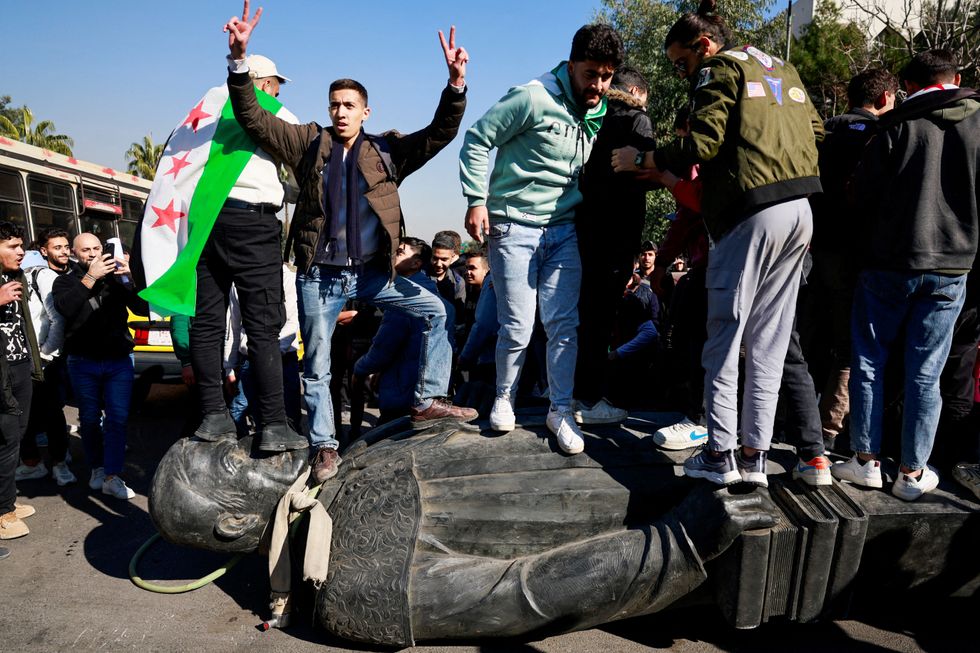The surprise attack on Bashar Assad's Syrian strongholds in December led to an almost immediate collapse of his family's dynasty and his dictatorship. This, after the Middle East had already been rocked by Israeli wars against Hamas in Gaza and Hezbollah in Lebanon. As of December, over 45,000 Palestinians in Gaza and over 4,000 people in Lebanon, mostly civilians, have been killed and millions displaced.





 Should the US take credit for Assad's downfall?Top image credit: Damascus University students stand on the toppled statue of the late Syria's President Hafez al-Assad, father of Bashar al-Assad, after Syria's Bashar al-Assad was ousted, in Damascus, Syria, December 15, 2024. REUTERS/Ammar Awad
Should the US take credit for Assad's downfall?Top image credit: Damascus University students stand on the toppled statue of the late Syria's President Hafez al-Assad, father of Bashar al-Assad, after Syria's Bashar al-Assad was ousted, in Damascus, Syria, December 15, 2024. REUTERS/Ammar Awad Assad's fall in December was heralded by Sunni Syrians, many of whom had been victims of Assad's brutality and displaced in the country's Civil War, which began in 2011 after Arab Spring related uprisings.
 Top Image Credit: A rebel fighter stands atop a military vehicle as he carries a Hayat Tahrir al-Sham flag in Saraqeb town in northwestern Idlib province, Syria December 1, 2024. REUTERS/Mahmoud Hassano/File Photo
Top Image Credit: A rebel fighter stands atop a military vehicle as he carries a Hayat Tahrir al-Sham flag in Saraqeb town in northwestern Idlib province, Syria December 1, 2024. REUTERS/Mahmoud Hassano/File PhotoExternal forces are at work all over this conflict. Turkey, Israel, the United States — news reports after Assad's fall suggested that even Ukraine had a hand in sending HTS drones for the battlefield.

Members of the Kurdish-led Syrian Democratic Forces (SDF) a flag in Deir al-Zor, after U.S.-backed alliance led by Syrian Kurdish fighters captured Deir el-Zor, the government's main foothold in the vast desert, according to Syrian sources, in Syria December 7, 2024. REUTERS/Orhan Qereman
The fate of the Kurdish independence movement, which has been backed by the U.S., is at the end of the year unknown. The Turks want to extinguish it, while the Kurdish Syrian Defense Forces have held on to valuable, oil rich territory in the northeast of Syria and are not likely to go easily. There are also 2,000 U.S. troops in the region and the U.S. has been engaging in airstrikes inside the country, reportedly against ISIS.
 top photo credit: Men hold a Syrian opposition flag on the top of a vehicle as people celebrate after Syrian rebels announced that they have ousted President Bashar al-Assad, in Damascus, Syria December 8, 2024. REUTERS/Firas Makdesi
top photo credit: Men hold a Syrian opposition flag on the top of a vehicle as people celebrate after Syrian rebels announced that they have ousted President Bashar al-Assad, in Damascus, Syria December 8, 2024. REUTERS/Firas MakdesiThe world watches as HTS claims power and wants the U.S. terror designation and sanctions lifted in order to begin rebuilding the country after more than a decade of war. Despite the calls by new leader Ahmad al-Sharaa, who leads HTS, for moderation and amnesty, reports in the waning days of 2024 tell of revenge crimes and raids by militias against Assadists in villages and towns. Meanwhile, al-Sharaa has said it may take up to four years for new elections in Syria.
- Diplomacy Watch: Will Assad’s fall prolong conflict in Ukraine? ›
- HTS: Can these Islamists truly unify a post-Assad Syria? ›















